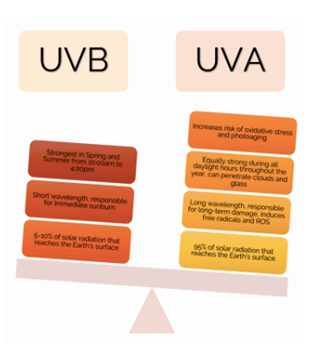Blog: June 2025

Summer is well and truly here and I am very hopeful this good weather is here to stay!! I will take some small breaks over the summer, so if there is a particular time or date you have in mind, please plan ahead and book in early 🏖
Click to Book!
The Science Bit: SPF (Sun Protection Factor)
☀️ Sun Safety Starts Here: Your Guide to SPF

🧴 Mineral vs. Chemical Sunscreen: What’s the Difference?
Mineral Sunscreen (physical sunscreen):
• Active ingredients: Zinc oxide, titanium dioxide
• How it works: Sits on top of your skin and reflects UV rays like a shield
• Pros: Great for sensitive skin, works immediately after application
• Cons: Can leave a white cast, especially on deeper skin tones
Chemical Sunscreen:
• Active ingredients: Avobenzone, octinoxate, oxybenzone, and others
• How it works: Absorbs into your skin and converts UV rays into heat
• Pros: Lightweight, often invisible on skin
• Cons: Can irritate sensitive skin, takes ~15 minutes to start working
⏰ How Often Should You Reapply?
Even the best sunscreen needs backup. Here's the general rule:
• Every 2 hours when you're outdoors
• Immediately after swimming or sweating
• More frequently if you're wiping your face or towel-drying
• Physical Protection from a hat or visor with sunscreen is the preferred approach
And yes — even on cloudy days or if you're sitting by a window. UV rays are sneaky like that!
Some frequent questions I get in clinic:
1) Which SPF is best: The first answer here is the one you find most comfortable to wear and are happy to put on every day. I have a few preferred options in clinic -
Intradermology Synergy 6 (lasts up to 6 hours and exceptionally lightweight) Alumier Clear Shield and Sheer Hydration, excellent sun protection and easy to wear day to day.
There are many great SPFs available on the high street, however, they may need to be refreshed more often. La Roche Posay Athelios is another firm favourite of mine.
2) Is the SPF in my make up enough: Short answer NO. Most make up brands will tell you they have SPF 30 or 50 but what they don't tell you is that you would need to apply nearly the whole bottle of foundation for that to apply. The amount of SPF in the pump or two that you are putting on to your face has been found to have an SPF of 2 - 10 ( and that is if you are applying liberally). Dont take any chances - put on a layer of SPF first and then your make up.
3) I'm wearing make up so I cant reapply: Don't be afraid to put your SPF on over your makeup and then top up your makeup as needed. So long as you are cleansing well in the evening, there is no problem in doing this.
There are sprays which are can be handy for reapplication (mesoestetic SPF spray) however the solvents in the SPF can cause issues with sensitive skin and the SPF doesn't always last as long, in terms of time on your face or before it goes off in the spray. I also find some don't rub in very well and the coverage can end up being patchy.
4) Tinted SPFs are bad: As you may have gathered from the information above, not all SPFs are created equal. Tinted SPF isn't inherently bad, it is more so that a lot of tinted SPFs may not be good quality SPF in the first place. (See make up above). If it is a good quality SPF then added tint will do no harm, if it is make up pretending to be SPF it will not work well.
There is some evidence to say that tinted SPFs can be helpful in tackling Melasma.
Tinted sunscreens with iron oxide content, help block Visible Light, offering an added layer of defense. In one randomized controlled trial (RCT), researchers compared two broad-spectrum SPF50 sunscreens, one of which contained iron oxides and offered protection against high-energy visible light (HEVL). This study, involving 68 participants, showed that the group using the iron oxide-containing sunscreen experienced significant improvements in Melasma Area Severity Index (MASI) scores, colorimetric values, and melanin assessment, all objective measures of melasma severity. An added benefit to using tinted sunscreens is that it not only helps prevent melasma but also offers cosmetic benefits by creating a more even skin tone!
The research that is there at present on this is all small studies, so while it seems promising, for now, I would hope to see more done on this in the future. If you suffer with melasma (or even if you don't) my advice would be to always wear a hat.
